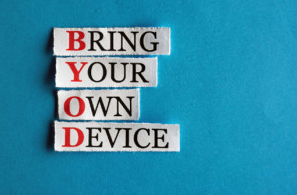
Here we ask three respected industry experts what advantages they believe the trend brings to businesses.

Here we ask three respected industry experts what advantages they believe the trend brings to businesses.
What is BYOD?
The trend for employees to use their own personal devices for work. This generally refers to smartphones and tablets. CompTIA’s Annual Trends in Enterprise Mobility shows that while just 4% of UK firms have a full BYOD policy, some 44% have a partial strategy in place.
BYOD keeps workers happy – DLA Piper’s John McKinlay
John McKinlay is a partner at law firm DLA Piper’s Intellectual Property and Technology team. He said BYOD helps keep employees happy by improving the user experience for office tech.
He explained: “Employers want their staff to be happy, motivated and productive, and effective use of technology has a major part to play in that. With the growth of personal use of technology through smartphones and tablets, it is no longer acceptable for the ‘user experience’ of office technology to lag behind.
“While employees understand security concerns, if they are defeated at every turn by unfamiliar devices or restrictive download policies, they will either disengage or (potentially worse) find ways to use their own technology ‘under the radar’. This means that organisations need to strike a difficult balance: get the maximum uptake and use of technology, while at the same time staying one step ahead of the current security and reputational threats.”
Productivity is the key advantage of BYOD – Novell’s Eileen Rainsberry
Eileen Rainsberry is marketing manager EMEA at Novell – a provider of infrastructure software. She says BYOD brings many benefits to employee productivity.
She explained: “The clear advantage of bring your own device is increased productivity. BYOD allows employees to use devices they are both comfortable and familiar with, resulting in greater productivity and even potential savings on training and hardware.
“But while BYOD is transforming the way we all work and employees love the flexibility it brings, we shouldn’t forget that it needs to be backed up with policy and processes to ensure that valuable corporate data remains secure and in the right hands.”
Increased productivity is the number one benefit – Deminos’ Neil Atkinson
Neil Atkinson is the managing director of HR experts Deminos. He said increased productivity is the number one benefit of BYOD.
He explained: “Employees may be more productive because they are working on their own devices. As well as increased levels of staff motivation, which comes from staff being able to take their tablets and phones home with them, they may end up doing more work in their own time as well. Employees are happier, more comfortable and often work faster if they use their own devices.”
“If there is the potential for the day-to-day functioning of the business to improve by members of staff using iPads, wouldn’t it be fantastic if the financial cost of these devices to the business were to be removed by letting them bring their own devices to work?
“These mobile devices are also often newer and more advanced than the equipment deployed by many IT departments. As people are increasingly using devices such as iPads and smartphones, BYOD is helping to change the way people want to work.”
3 interesting BYOD statistics
Below we have handpicked 3 statistics that chart the rise of BYOD and show why UK firms need it – stats from CompTIA’s 3RD Annual Trends in Enterprise Mobility.
1) 65% of medium-sized enterprises in the UK have some form of BYOD policy in place compared to 55% of small firms
2) 36% of UK employees spend 50% of their time travelling, while 25% are split between office and home
3) 59% of organisations say employees’ regular device portfolio requires a smartphone
Does your business use a BYOD scheme? Tell us about your experiences in the comments.